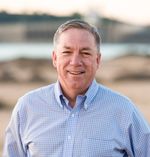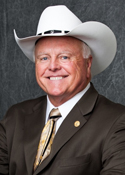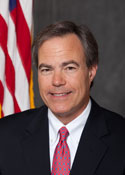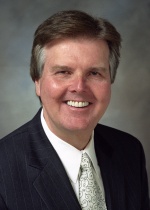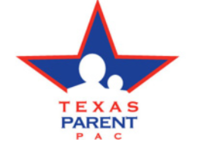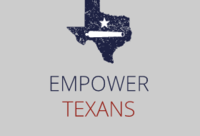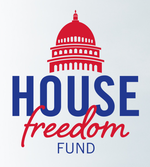Heart of the Primaries, Republicans-Issue 8 (March 5, 2018)

This week: All eyes turn to the Texas primaries. We highlight the races to watch, the issues in play, and the scores some hope to settle. Want more primary coverage? Click here to follow the latest in the Democratic contests. Have a tip or see something we missed? Email us at editor@ballotpedia.org. And please share this newsletter with your colleagues!
- Upcoming filing deadlines: March 6 (Oregon), March 9 (California, Georgia, Idaho)
- Passed filing deadlines: 12
- Upcoming elections: March 6 (Texas), March 20 (Illinois)
- Declared U.S. Senate and U.S. House candidates: 1,209 Democrats, 880 Republicans
Republican pundits on the news
Where do Republican and conservative pundits disagree? Each week in Heart of the Primaries, we bring you excerpts that highlight differing views.
“There are so many signs of a coming rout in the House in November that’s it’s almost impossible to envision any way for Republicans to hang on to their 24-seat majority. And yet a faint outline of how the party might pull it off is nevertheless taking shape.” - Charlie Mahtesian, Politico, Feb. 27, 2018
“But it’s a bit premature to place your bets on the 2018 congressional sweepstakes, for several reasons: forecasts that the economy will take off later this year as a result of the GOP’s massive tax cuts, increasing incomes and jobs, not to mention that the Democrats are having problems of their own.” - Donald Lambro, Townhall, March 2, 2018
U.S. Congress
U.S. House
- Democratic seats heading into November: 193
- Republican seats heading into November: 238
- Open seats: 51
- Open seats currently held by a Democrat: 16
- Open seats currently held by a Republican: 35
- Seats with a Republican incumbent carried by Clinton: 23
- Seats with a Democratic incumbent carried by Trump: 12
U.S. Senate
- Democratic seats heading into November: 49*
- Republican seats heading into November: 51
- Open seats: 3
- Open seats currently held by a Democrat: 0
- Open seats currently held by a Republican: 3
- Seats with a Republican incumbent carried by Clinton: 1
- Seats with a Democratic incumbent carried by Trump: 10
Wicker gets challenger in Mississippi Senate race
State Sen. Chris McDaniel (R) (pictured left) entered the U.S. Senate race in Mississippi Wednesday, challenging Trump-backed incumbent Sen. Roger Wicker.
Wicker has a $4.1 million war chest. But the pro-McDaniel super PAC Remember Mississippi reported $850,000 cash on hand in 2017. The PAC’s major donors are Robert Mercer and Richard Uihlein.
Herrell gets New Mexico GOP endorsement, top billing on NM-02 ballot
The New Mexico Republican Party endorsed State Rep. Yvette Herrell (R) over former state party chairman Monty Newman for New Mexico’s 2nd Congressional District. She’ll be listed first on the Republican primary ballot.
According to New Mexico political writer Joe Monahan, Herrell had the backing of party activists opposed to Gov. Susana Martinez (R), while Newman allied himself with the governor. Newman called Herrell’s endorsement a “symbolic victory among insiders.”
One of those insiders told Monahan, “With activists so solidly and decisively behind [Herrell] she's going to be hard to beat.”
Wright will join House Freedom Caucus if elected to TX-06
U.S. Sen. Ted Cruz (R-Texas) endorsed former Tarrant County Tax Assessor Ron Wright (R) for Texas’ 6th Congressional District Thursday. Wright, who leads the field in endorsements and fundraising, said that he will join the House Freedom Caucus if elected.
Wright’s top rival is former Navy pilot Jake Ellzey (R). Former Texas Gov. Rick Perry and The Dallas Morning News have endorsed Ellzey, who said he would remain independent from House caucuses if elected.
Lesko wins AZ-08 Republican primary
Former state Sen. Debbie Lesko (R) won the Republican primary in Arizona's 8th Congressional District special election Tuesday with 36 percent of the vote, topping former state Sen. Steve Montenegro (R) and former state Rep. Phil Lovas (R).
Journalists covering the race said sexual misconduct allegations hurt Montenegro. But Arizona State University’s David Wells told Ballotpedia he believed “endorsements and prior representation for the district” were the keys to Lesko’s win.
Governors
| Governors: key information | |
|---|---|
| Open seats | 17 |
| Open seats held by a Democrat | 4 |
| Open seats held by a Republican | 13 |
| States with a Republican incumbent that were carried by Clinton | 8 |
| States with a Democratic incumbent that were carried by Trump | 1 |
Doug Ose ends bid for California governorship
Former Rep. Doug Ose (R-CA) suspended his gubernatorial campaign Monday, citing poor fundraising. “There’s no money in the Republican donor community” Ose said. "If I don’t have the money to get my message out, it doesn’t make sense to go ahead."
The June 5 primary is a top-two primary. All gubernatorial candidates appear on the same ballot regardless of partisan affiliation. The top two finishers advance to the November election.
Republican Party of California Chairman Jim Brulte said that he hoped more candidates would follow Ose in order to reduce the chances that two Democrats would advance. Thirteen Republicans, including Assemblyman Travis Allen (R) and businessman John Cox (R) are in the primary.
"I would prefer to see one (Republican) candidate in the primary,” Brulte said. “If that happens, then we are in the general election."
The filing deadline is March 9.
California Republicans party profile:
- Presidential elections carried since 1980: 3/10
- Gubernatorial elections won since 1978: 5/10
- Seats held in U.S. Senate: 0/2
- Seats held in U.S. House: 14/53
- Statewide partisan elected offices held: 0/7
- Seats held in state Senate: 13/40
- Seats held in state Assembly: 25/80
Trump endorses Sid Miller
President Trump endorsed Texas Agriculture Commissioner Sid Miller (R) for re-election Tuesday.
Trump also endorsed Gov. Greg Abbott (R), Lt. Gov. Dan Patrick (R), Attorney General Ken Paxton (R), and Land Commissioner George P. Bush (R).
Miller faces Trey Blocker (R) and Jim Hogan (R) in the March 6 primary, which is open to all voters.
Blocker says Miller has mismanaged the Department of Agriculture during his first term. Miller says Blocker's past as a lobbyist and his alleged support for Democratic candidates are disqualifying.
University of Houston professor Brandon Rottinghaus said there’s a possibility Republicans might “reject Miller for acting in a non-conservative way by raising fees, even if they applaud his tone and tactics.”
Texas Republicans party profile:
- Presidential elections carried since 1980: 10/10
- Gubernatorial elections won since 1978: 8/10
- Seats held in U.S. Senate: 2/2
- Seats held in U.S. House: 25/36
- Statewide partisan elected offices held: 9/9
- Seats held in state Senate: 20/31
- Seats held in state House: 93/150
Legislatures
Republicans control 32 state legislatures heading into the November 2018 midterms. Over the eight years of the Obama presidency, Republicans picked up 948 seats in state legislatures. This chart tracks the number of candidates running, incumbents retiring, primary challenges to incumbents, and total primaries for Republicans in 2018 compared to the same point in the 2016 elections based on the states where filing deadlines have passed.
Takeaways: In Alabama*, Illinois, Indiana, Kentucky, Ohio, Texas, and West Virginia, where candidate lists are now final, the number of Republican candidates running has increased 25.8 percent. The number of incumbents retiring has increased 77.6 percent. The number of Republican incumbents facing challenges has increased 38.9 percent and the number of Republican primaries has increased 36.7 percent.
*Alabama did not hold state legislative elections in 2016
Tuesday’s Texas Republican legislative primaries
The major conflict in Tuesday’s GOP primaries is between Republican allies and opponents of outgoing House Speaker Joe Straus (R) (pictured left). The conflict has spilled over into a number of state Senate races, with Lieutenant Gov. Dan Patrick (R) (pictured right) usually aligning with the anti-Straus candidates.
Remember: If no candidate receives more than 50 percent of the vote in a race, a runoff will be held May 22. Two of seven state Senate races and 17 of 41 state House races have more than two candidates and could potentially go to a runoff.
Our top 10 races to watch: Click here to check them out!
What the major players are doing
Gov. Greg Abbott (R) has endorsed three anti-Straus candidates since the beginning of February and is campaigning for the three primary challengers he endorsed over pro-Straus incumbents.
Straus spent $670,000 on his allies in contested primaries. Straus also laid out the three major issues he thinks Republican primary voters should consider: education funding, local control for municipalities, and bathroom regulations he opposed in 2017.
Lieutenant Gov. Dan Patrick (R) endorsed anti-Straus state Rep. Pat Fallon in his challenge of state Sen. Craig Estes. Patrick has spent $550,000 on his preferred Senate candidates.
Get schooled on education policy in the Texas Republican primaries
Education is one of the issues dividing pro- and anti-Straus Republicans. Generally, pro-Straus Republicans support increased public education funding while anti-Straus Republicans support school choice.
This issue came to a head in the 2017 legislative special session when the anti-Straus dominated state Senate cut a school funding bill that passed the Straus-led House from $1.8 billion to $351 million. Straus and his lieutenants reluctantly accepted the Senate version.
Ballotpedia spoke to two groups on opposite sides of the issue: Carolyn Boyle of the pro-Straus Texas Parent PAC, and Cary Cheshire of the anti-Straus Empower Texans.
Ballotpedia: How does education divide Republicans in the state legislative primaries?
Boyle: There are two factions of Republican candidates...Those who are committed to the Texas Constitution Article 7 and work for a strong public education system statewide... And alternatively...those with an anti-government ideological perspective who are not friends of public education. They...seek to privatize public education and divert funds to private, religious, and for-profit elementary and secondary education.
Ballotpedia: What effect has the education issue had on the primaries?
Boyle: There have been aggressive efforts by some politicians and Empower Texans to suppress the educator vote. That has seemed to generate even more interest in voting by active and retired educators and public school parents. In 2018, there is synergy among pro-education groups supporting great candidates and working to turn out voters.
Ballotpedia: How does education divide Republicans in the state legislative primaries?
Cheshire: The party’s liberal wing is siding with Democrats and labor unions to oppose changes to the status quo, mainstream Republicans led by Gov. Greg Abbott and Lt. Gov. Dan Patrick are promoting conservative reform including school choice and property tax relief.
Ballotpedia: What effect has the education issue had on the primaries?
Cheshire: A huge impact. Threatened by the prospect of school choice Democrats and labor unions are organizing in force to influence the Republican primary—even convincing Democrats and teachers to cross over into the Republican primary and prevent school choice advocates from gaining ground.
Early voting in Texas Republican primaries similar to 2014
Texas Republicans voted early at about the same rate as they did in 2014. Data from 14 Texas counties showed that about 4.2 percent of registered voters had voted early in the Republican primaries. This was roughly the same percentage as in 2014. The number of total registered voters rose by 14.4 percent and the number of Republicans voting early rose by 12.6 percent.
In contrast, about 4.8 percent of registered voters in the 14 counties voted early as Democrats, more than doubling their 2014 numbers.
The 11-day early voting period ran from Feb. 20 to March 2. The 14 counties in the analysis represent about 62 percent of all registered voters in Texas in 2014. Texas has open primaries, meaning registered voters can cast ballots in either party’s primary.
Power Players
A weekly feature on an influencer shaping the direction of the party.
House Freedom Fund
"Change in Washington means changing the people we send there and HFF [the House Freedom Fund] is making that happen by sending principled, conservative outsiders to D.C." -U.S. Rep. Mark Meadows (R-N.C.), chair of the House Freedom Caucus
The House Freedom Fund posted its first win of the 2018 cycle with conservative Debbie Lesko's (R) primary victory in the special election in Arizona's solidly red 8th Congressional District.
Most of the Fund's other endorsements this year fit a similar profile. Russ Fulcher in ID-01, TN-06's Judd Matheny, TN-07's Mark Green, and TX-21's Chip Roy are all conservative candidates running for open seats in likely or safely Republican districts.
Conservative Steve Bloom announced his bid for the open seat in Pennsylvania’s safely Republican 11th District before switching to the 13th District following court-ordered changes to the state’s congressional maps.
The Fund is a Meadows leadership PAC and is the political arm of the conservative House Freedom Caucus.
According to McClatchy's Brian Murphy, Meadow’s strategy is to "endorse primary candidates in eight to 10 heavily Republican districts where no incumbent is running for re-election, hoping to elevate the more conservative candidate."
One exception to that rule is the special election in Pennsylvania's 18th Congressional District, where Fund-endorsed Rick Saccone (R) faces Democratic candidate Conor Lamb and Libertarian Drew Miller.
Election forecasters consider the race a toss-up.
What we’re reading
- “The Coming Clash of the GOP Titans” (The American Conservative)
- "Look to Panhandle conservatives to defy Texas’ shift to the far right” (The Dallas Morning News)
- “America Is Still Saddled with the Politics of the Seventies” (National Review)
- “Redistricting battles heighten the stakes for 2018 gubernatorial races” (The Washington Post)



